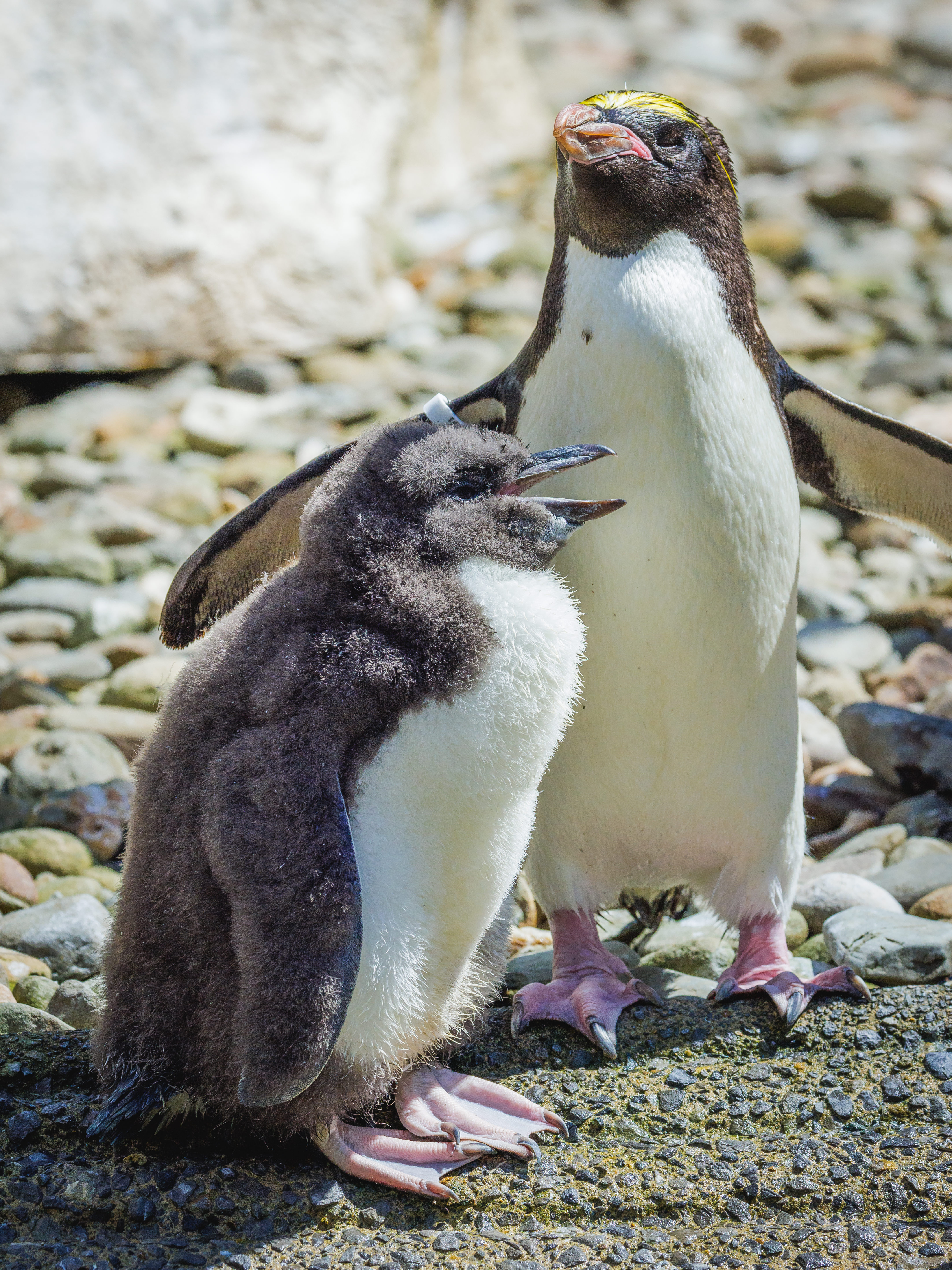Folly Farm Keepers Caroline ‘Caz’ Davies and Catrin Thomas share the amazing story of their colony of macaroni penguins.
In 2013, Folly Farm welcomed penguins to the zoo with the arrival of 24 Humboldt penguins to a brand-new habitat, ‘Penguin Coast’. Since then, we have successfully hatched over 40 chicks, all of which have been parent reared, and have been sent to other zoos as part of the EAZA Ex Situ Programme (EEP). The penguins are, of course, much loved at Folly Farm and receive lots of attention from our dedicated keeper team.
Meanwhile, Living Coasts in Devon were breeding Macaroni penguins and in 2018 we were able to welcome male Macaroni Penguins from Living Coasts, which we were able to care for alongside our colony of Humboldt penguins.
.jpg)
The macaroni penguins arriving at their new home at Folly Farm
In 2020, like so many, we were devastated to hear the news that Living Coasts were to close its doors for the last time following the pandemic. This was a bittersweet moment for us as they had to rehome all of their animals, but we were honoured to be given the opportunity to take on the whole Macaroni penguin breeding colony. After two years of successfully housing the two species together, we were confident a larger colony would integrate well.
Clare Rugg from Paignton Zoo and formerly at Living Coasts said at the time:
“When we heard that Living Coasts was to close, the first thing we needed to do was to ensure that we find suitable homes for the animals. We had previously worked with Folly Farm and they already held some of our Macaroni penguins from a previous move.
“Folly Farm was therefore an obvious choice when moving the Macaroni penguins. They have an excellent track record in keeping penguins and had a suitable enclosure for them. The move was also agreed by the European penguin Taxon Advisory Group (TAG). We were of course sad to see them go but happy knowing they were going to a fantastic new home.”
After many years of successfully breeding Humboldt penguins, we were excited for this new challenge that lay ahead. The new species led to a different approach to breeding requirements. Humboldt’s breed well in a burrowed nest whereas Macaroni’s are very exposed to the elements, preferring to nest in uncovered rockeries.
After a few unsuccessful attempts by other breeding pairs, we were more optimistic this year when a new pair was formed. They created a nest together in a new area of the enclosure, up high on boulders, utilising the surrounding pebbles. Two eggs were laid and although only one chick hatched, they both took it in turns to incubate the eggs and rear the chick that hatched on the 14 June 2024. Keen to make use of this opportunity, we removed the eggshell from the nest shortly after hatching and sent for DNA sampling to help us understand more.

Ravioli is growing well at Folly Farm. Photo credit: Drew Buckley
The chick has been growing well with a voracious appetite. Four weeks after the chick hatched however, we noticed the other Macaroni’s becoming a little too inquisitive about the new arrival. The chick was only four weeks old, so the decision was made to move the pair and chick to an off-show area to continue rearing in peace. Rearing a chick in this way is never an easy choice to make but as always – we had to put the welfare interests of the chick at the forefront of our decision making.
Now at 10 weeks of age the chick is transitioning from parent feeding to taking whole fish from the keepers – and enjoying every bite!
We were thrilled to find out that the chick was a male, who was later named Ravioli, and he should join the rest of the colony in the main pool again soon.
This initial success is testament to the amazing level of care and the dedicated team at Folly Farm as well as working closely with the team at Living Coasts. We hope this bodes will for future success with this enigmatic penguin.
By Caroline ‘Caz’ Davies and Catrin Thomas
All blogs reflect the views of their author and are not necessarily a reflection of BIAZA's positions
Related Members
-
News
.png?w=100&h=100&zc=1&f=jpeg&hash=97e6d151315c515d23f80e6ee9d1d533) BIAZA Blog: How Accreditation is creating change at BIAZA 25th February, 2026After two years of BIAZA Accreditation, the team delivers a look ahead on the programme to support and boost world-class zoos…
BIAZA Blog: How Accreditation is creating change at BIAZA 25th February, 2026After two years of BIAZA Accreditation, the team delivers a look ahead on the programme to support and boost world-class zoos… -
News
.png?w=100&h=100&zc=1&f=jpeg&hash=a0b01e801771c24b4d7f5c3df4abed98) Twycross Zoo Welcomes Its First Baby of 2026: An Endangered Pileated Gibbon 19th February, 2026Conservation charity, Twycross Zoo, is celebrating a heart-warming milestone with the arrival of its first baby of 2026 - an endangered pileated gibbon,…
Twycross Zoo Welcomes Its First Baby of 2026: An Endangered Pileated Gibbon 19th February, 2026Conservation charity, Twycross Zoo, is celebrating a heart-warming milestone with the arrival of its first baby of 2026 - an endangered pileated gibbon,… -
News
.png?w=100&h=100&zc=1&f=jpeg&hash=c8eadb7dce959e1a8e6be51070cd0b3b) Conservation breeding success as Endangered spotted deer fawn is born at Bristol Zoo Project 19th February, 2026An extremely rare spotted deer fawn has been born at Bristol Zoo Project, marking another important conservation milestone for this Endangered species.…
Conservation breeding success as Endangered spotted deer fawn is born at Bristol Zoo Project 19th February, 2026An extremely rare spotted deer fawn has been born at Bristol Zoo Project, marking another important conservation milestone for this Endangered species.…



